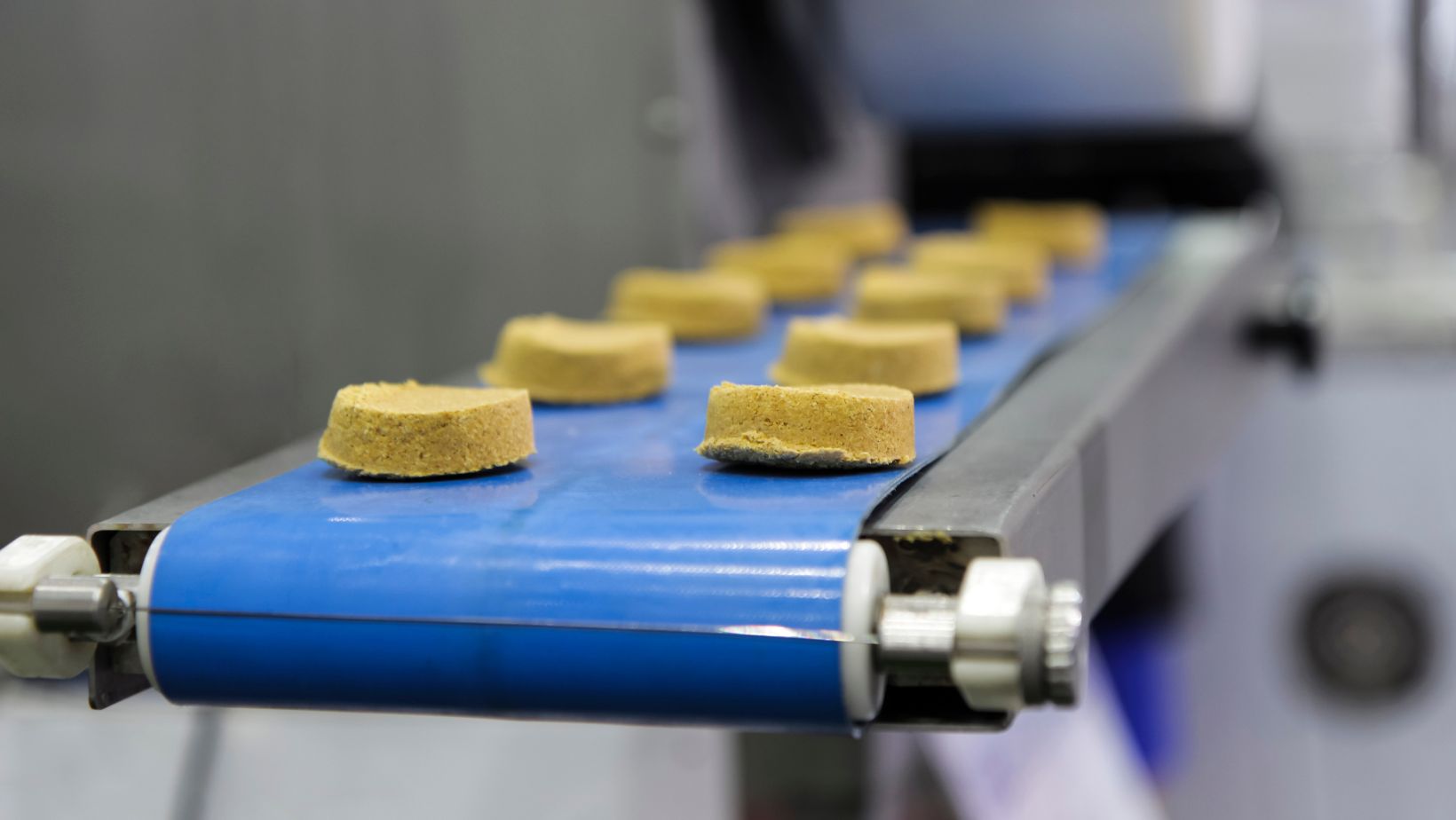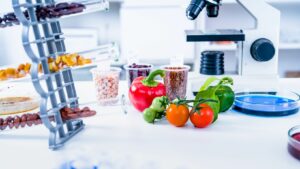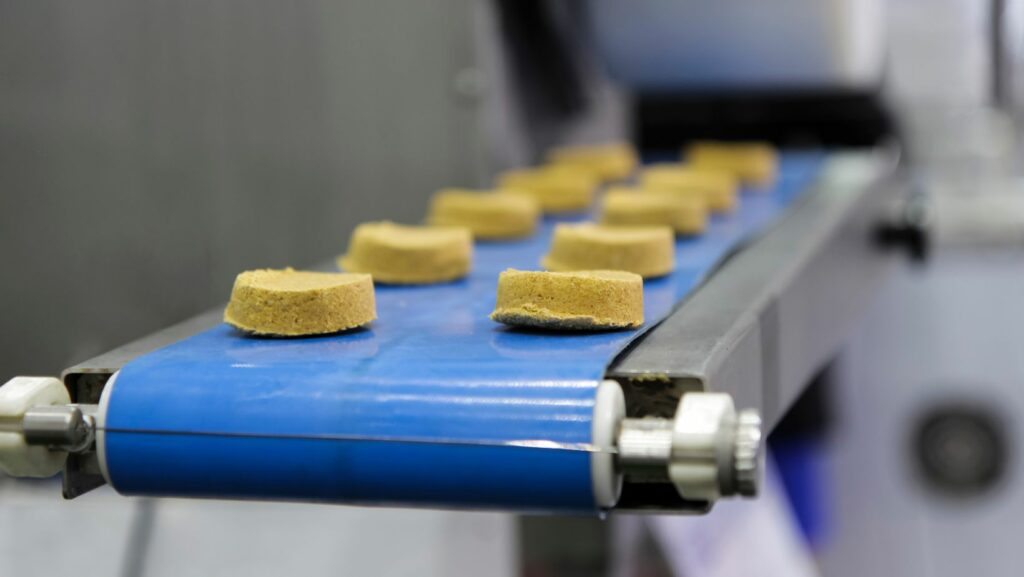 Innovation in Food Technology
Innovation in Food Technology
- Sustainability is Key: Innovations in food technology are primarily driven by the need for sustainable practices, reducing environmental impacts while increasing efficiency in food production and distribution.
- Emergence of Cellular Agriculture: Lab-grown meats and precision fermentation are pivotal in rethinking traditional farming, lowering greenhouse gas emissions, and creating alternative protein sources.
- Smart Farming Techniques: The integration of IoT devices and data analytics in agriculture enhances crop yields and resource management, supporting sustainable practices essential for food security.
- Improved Food Safety: Advanced preservation methods like high-pressure processing and intelligent packaging enhance food safety while addressing consumer demand for nutritious options.
- Role of Biotechnology: Genetic engineering and fermentation innovations play a crucial role in optimizing food products and improving nutritional quality, responding effectively to current consumer trends.
- Consumer-Driven Changes: The future of food technology is shaped by evolving consumer preferences for health, transparency, and sustainability, leading to increased adoption of technologies like blockchain for traceability.
Food technology is rapidly evolving, driven by a need for sustainability, efficiency, and enhanced flavors. Innovations in this field are reshaping how food is produced, processed, and consumed, making it more accessible and nutritious. From lab-grown meats to smart farming techniques, the advancements are not just trends; they’re essential solutions to global challenges like food security and environmental impact.
As consumers become more health-conscious and environmentally aware, the demand for innovative food solutions grows. Companies are leveraging cutting-edge technologies such as artificial intelligence and biotechnology to create products that cater to these evolving preferences. This article explores the latest breakthroughs in food technology, highlighting how these innovations are transforming the culinary landscape and paving the way for a more sustainable future.
Overview of Innovation in Food Technology
Innovation in food technology encompasses a wide range of advancements aiming to improve food production, preservation, and consumption. Numerous techniques, such as cellular agriculture and precision fermentation, address critical issues like climate change and resource management.
Cellular agriculture enables the development of lab-grown meats, reducing the reliance on traditional livestock farming. This method lowers greenhouse gas emissions and decreases land use. Precision fermentation allows for the creation of alternative proteins and other ingredients, enhancing nutritional profiles while utilizing fewer resources.
Smart farming integrates IoT devices and data analytics in agriculture, optimizing crop yields and resource usage. Drones and sensors collect data on soil health and pest activity, allowing farmers to make informed decisions. This data-driven approach supports sustainable practices, contributing to overall food security.
Food processing technologies like high-pressure processing (HPP) enhance food safety without additives. HPP prolongs shelf life while preserving nutrient content, addressing consumer demand for healthier options.
Advancements in packaging technology, such as biodegradable or compostable materials, reduce environmental impact. Smart packaging that monitors freshness correlates directly with consumer safety and waste reduction.
Overall, innovation in food technology drives progress toward a sustainable and efficient food system, aligning with consumers’ health and environmental priorities. Organizations prioritize research and development to continue these transformative advancements, actively shaping the future of food.
Key Trends Shaping Food Technology
Key trends are driving innovation in food technology, promoting sustainability and efficiency while meeting consumer demands. Significant advancements in sustainable practices and digital transformation are reshaping the industry’s landscape.
Sustainable Practices
Sustainable practices in food technology focus on minimizing environmental impact and maximizing resource efficiency. Companies leverage techniques such as regenerative agriculture, which enhances soil health and biodiversity. Vertical farming increases crop yields in urban areas while using less water and land. Aquaponics combines fish farming with plant cultivation, creating a closed-loop system that reduces waste. Packaging innovations, like compostable materials, decrease plastic waste and improve product shelf life. Collectively, these practices contribute to a more sustainable food supply chain.
Digital Transformation
Digital transformation revolutionizes how food companies operate, enhancing efficiency and consumer engagement. Technologies such as artificial intelligence (AI) and machine learning analyze supply chain data to optimize inventory management. Blockchain technology improves traceability and transparency, allowing consumers to track food origins. Mobile applications enable personalized nutrition and meal planning, catering to individual preferences. Additionally, data analytics facilitate targeted marketing strategies and improve customer experiences. This digital shift enhances productivity and fosters a more informed consumer base.
Impact of Innovation on Food Safety
Innovation in food technology significantly improves food safety through enhanced preservation and rigorous quality control measures.
Enhanced Food Preservation
Food preservation techniques have evolved, ensuring extended shelf life and safety for consumers. Technologies like high-pressure processing (HPP) eliminate pathogens without chemicals, protecting nutrient quality. Vacuum sealing prevents oxidation and spoilage, preserving freshness. Additionally, intelligent packaging actively adjusts to environmental conditions, providing real-time information on food quality. These advancements substantially reduce food waste and enhance overall safety in the supply chain.
Quality Control Measures
Quality control measures in food production are vital for ensuring consumer safety. Automation and AI-driven analytics allow for precise monitoring of production processes. Real-time data collection helps identify potential contamination risks early. Blockchain technology enhances traceability, enabling swift responses to food safety incidents. Advanced laboratory testing methods, such as PCR and rapid microbiological assays, detect foodborne pathogens more effectively. These measures contribute to a safer food supply, addressing consumer health concerns comprehensively.
Role of Biotechnology in Food Production
Biotechnology plays a crucial role in food production, enhancing efficiency and sustainability. It leverages scientific techniques to innovate food processes and improve crop and livestock characteristics.
Genetic Engineering
Genetic engineering enables precise modifications of an organism’s DNA, resulting in enhanced traits such as increased yield, pest resistance, and improved nutritional value. Significant examples include:
- Bt Crops: Crops genetically modified to express toxins from the Bacillus thuringiensis bacteria, which provide built-in pest resistance, reducing the need for chemical pesticides.
- Golden Rice: A biofortified rice variety enriched with Vitamin A, addressing nutritional deficiencies in populations reliant on rice as a staple food.
- Drought-Tolerant Varieties: Plants engineered for improved resilience to drought conditions, increasing food security in arid regions.
These applications minimize the environmental impact and maximize productivity, contributing to sustainable food systems.
Fermentation Innovations
Fermentation innovations utilize microorganisms to transform raw ingredients into valuable food products, enhancing flavor, texture, and nutritional content. Key advancements in fermentation include:
- Precision Fermentation: Techniques that optimize microbial processes to craft alternative proteins, using fewer resources while meeting protein demands.
- Probiotics Production: Development of functional foods containing beneficial bacteria, promoting gut health and overall well-being in consumers.
- Sustainable Alcohol Production: Fermentation processes that convert agricultural waste into biofuels and spirits, reducing reliance on fossil fuels and minimizing waste.
These innovations demonstrate biotechnology’s capacity to create diverse and sustainable food products, thereby meeting the evolving needs of consumers while addressing environmental challenges.
Future Directions for Food Technology
Food technology continues to evolve, guided by changing consumer preferences and the emergence of innovative technologies. This section outlines how these factors shape the future landscape of food technology.
Consumer Preferences
 Consumer preferences increasingly emphasize health, sustainability, and transparency. Consumers actively seek foods that align with their dietary needs and ethical values, influencing product development. They tend to favor plant-based proteins, organic ingredients, and local sourcing, promoting cleaner labels and reduced environmental footprints. Brands are responding by launching products that highlight these attributes. As awareness of food systems grows, transparency in sourcing and production practices becomes essential. Companies adapt by employing technologies that track food origins, enhancing consumer trust and engagement.
Consumer preferences increasingly emphasize health, sustainability, and transparency. Consumers actively seek foods that align with their dietary needs and ethical values, influencing product development. They tend to favor plant-based proteins, organic ingredients, and local sourcing, promoting cleaner labels and reduced environmental footprints. Brands are responding by launching products that highlight these attributes. As awareness of food systems grows, transparency in sourcing and production practices becomes essential. Companies adapt by employing technologies that track food origins, enhancing consumer trust and engagement.
Emerging Technologies
Emerging technologies promise to revolutionize food production and distribution. Automation, robotics, and machine learning optimize food processing, ensuring consistency and reducing waste. Technologies like blockchain improve supply chain transparency, providing real-time data on sourcing and safety. Vertical and urban farming techniques maximize space utilization and reduce transportation emissions by growing food closer to consumers. Artificial intelligence enhances decision-making processes in farming, improving resource allocation and crop management. Additionally, advancements in fermentation and cultured products, including lab-grown meats and dairy alternatives, cater to diverse dietary preferences while minimizing environmental impacts. As these technologies advance, they redefine traditional practices, creating a more efficient, sustainable food ecosystem.
Dynamic and Impactful
The landscape of food technology is undergoing a remarkable transformation. Innovations are not just enhancing food production but are also addressing pressing global challenges. As advancements in biotechnology and smart farming continue to evolve, they pave the way for a more sustainable and efficient food system.
The shift towards healthier and environmentally friendly options is reshaping consumer preferences. Companies that embrace these innovations will not only meet the demands of modern consumers but will also contribute to a more sustainable future. The ongoing commitment to research and development ensures that the journey of food technology will remain dynamic and impactful.



